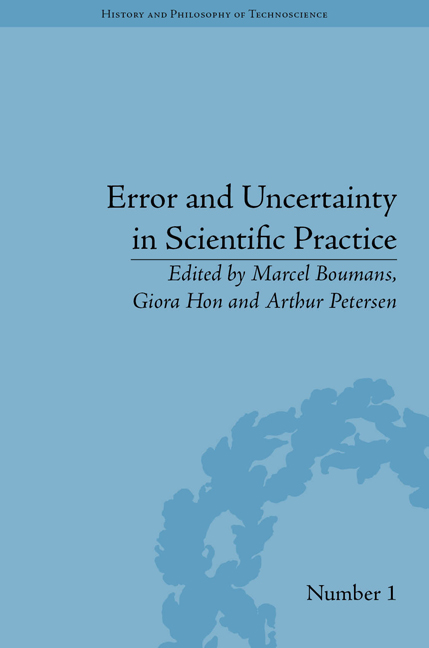Book contents
- Frontmatter
- Contents
- Acknowledgements
- List of Contributors
- List of Figures and Tables
- Introduction
- 1 The Lack of a Satisfactory Conceptualization of the Notion of Error in the Historiography of Science: Two Main Approaches and Shortcomings
- 2 Experimental Knowledge in the Face of Theoretical Error
- 3 Learning from Error: How Experiment Gets a Life (of its Own)
- 4 Modelling Measurement: Error and Uncertainty
- 5 Handling Uncertainty in Environmental Models at the Science–Policy–Society Interfaces
- 6 Variations on Reliability: Connecting Climate Predictions to Climate Policy
- 7 Order and Indeterminism: An Info-Gap Perspective
- 8 Learning from Data: The Role of Error in Statistical Modelling and Inference
- Notes
- Index
Introduction
- Frontmatter
- Contents
- Acknowledgements
- List of Contributors
- List of Figures and Tables
- Introduction
- 1 The Lack of a Satisfactory Conceptualization of the Notion of Error in the Historiography of Science: Two Main Approaches and Shortcomings
- 2 Experimental Knowledge in the Face of Theoretical Error
- 3 Learning from Error: How Experiment Gets a Life (of its Own)
- 4 Modelling Measurement: Error and Uncertainty
- 5 Handling Uncertainty in Environmental Models at the Science–Policy–Society Interfaces
- 6 Variations on Reliability: Connecting Climate Predictions to Climate Policy
- 7 Order and Indeterminism: An Info-Gap Perspective
- 8 Learning from Data: The Role of Error in Statistical Modelling and Inference
- Notes
- Index
Summary
There is no general theory of error, and there will never be one. Indeed, the task of theorizing error is insurmountable. The author of the entry, ‘Erreur’, in the Encyclopédie of Diderot and d'Alembert had already cautioned in the mid-eighteenth century that, although several philosophers detailed the errors of the senses, the imagination and the passions, their imperfect theories are ill-suited to cast light on practical decisions. And, he continued, the imagination and passions are enfolded in so many ways and depend so strongly on temperaments, times and circumstances, that it is impossible to uncover all the hidden forces that the imagination and passions activate. A century later the English logician de Morgan concurred, ‘There is no such thing as a classification of the ways in which men may arrive at an error; it is much to be doubted whether there ever can be’. The study of error cannot commence with a successful stroke of disambiguation upon which a coherent and all-embracing theory could be founded. Historically and etymologically ‘error’ may be traced to the Latin root ‘errare’, which originally had two contrasting meanings: first, ‘to go this way and that, to walk at random’ and second, ‘to go off the track, to go astray’. So right at the origin of the term, there is a tension between aimless wandering and straying from some definite path.
- Type
- Chapter
- Information
- Error and Uncertainty in Scientific Practice , pp. 1 - 12Publisher: Pickering & ChattoFirst published in: 2014



